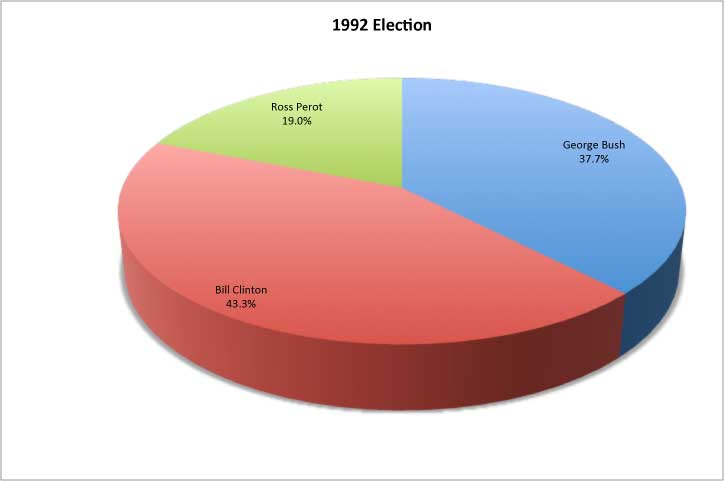Results 1992 Election

Bill Clinton Election 1992
General Election Results - 5 October 1992: General elections had last taken place in December 1985, and were normally due five years later. However, on several occasions, polling was postponed and the National Assembly’s term extended due to complications in the compilation of a new electoral register. PARLIAMENTARY ELECTION.Petitions were filed by candidates challenging the results in two constituencies. When the results were officially declared, both the National Democratic Congress (NDC) and New Patriotic Party (NPP) each gained an additional seat, bringing their totals to 115 and 108, respectively.
| |||||||||||||||||||||||||||||||||||||||||||||||||||||||||||||||||||||||||||||||||||||||||||
SUMMARY:
The 1992 U.S. presidential election saw Democratic Governor of Arkansas Bill Clinton defeat incumbent Republican President George H.W. Bush and independent Ross Perot. The election was notable for the presence of three major candidates as well as the centrality of economic issues to the campaign.

DESCRIPTION:
The 1992 election was the first presidential election since 1968 in which a third party candidate garnered a significant percentage of the popular vote. Although billionaire Texas businessman Ross Perot failed to win any Electoral College votes, his presence had an important effect on the election. For one, Perot's concerns about free trade, federal budget deficits, and the U.S. national debt helped solidify economic issues as one of the primary concerns of the campaign. Moreover, although there remains some debate about Perot's impact on the outcome of the election, most analysts conclude that his presence (Perot won 18.9% of the popular vote) drew support away from incumbent Republican President George H.W. Bush (who won 37.5%) and helped swing the election to Democratic Governor Bill Clinton of Arkansas (43%). The 1992 election was also significant in that it ended twelve years of Republican control of the White House and marked just the fourth time in the twentieth century that a sitting President was denied re-election.
Many observers have blamed Bush's defeat on his reneging on his 1988 campaign pledge to refrain from raising taxes. However, the most important factor in Bush's defeat was discontent with the state of the nation's economy. The sluggish recovery from the 1990-91 recession created an anti-incumbency mood that Bush proved unable to overcome. The importance of economic conditions in the 1992 presidential election was famously summed up by Clinton campaign adviser James Carville's quip that 'it's the economy, stupid.'
1992 Election Results In Ghana

Election Results 1992
George Bush's failure to address concerns about the nation's economy effectively—particularly when contrasted with Bill Clinton's ability to do so—was exemplified in the following exchange from the second Presidential debate of October 15, 1992. The video also demonstrates the ways in which the federal budget deficit and national debt were important campaign issues—even though these issues were often poorly understood and articulated.
FURTHER INFORMATION:
Gene Brown, The 1992 Election (Turtleback Books, 1999).
Jack W. Germond and Jules Witcover, Mad as Hell: Revolt at the Ballot Box, 1992 (Warner Books, 1993).
Texas 1992 Election Results
Peter Goldman, Thomas M. DeFrank, Mark Miller, Andrew Murr, and Tom Matthews, Quest for the Presidency 1992 (Texas A&M University Press, 1994).